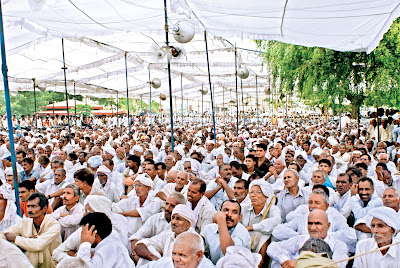It was only a few days back that
Time magazine had branded Prime Minister Manmohan Singh as an ‘underachiever’ on its cover. The grave fault the US magazine found with the economist PM was that he ‘refused to stick out his neck’ for the liberalisation reforms.
Well... The magazine is entitled to its opinions as it operates from a free country. We regret to tell you that majority of the 1.3 billion citizens of our country live on below $1 per day (Though according to Planning Commission that might be upscale lifestyle) and their priority is not exactly rolling out red carpet welcome to Wal-Mart and other global giants circling the Indian retail skies.
The BJP was quick to grab the new stick to beat the Centre with, but seems to be oblivious to the fact that the same magazine had described its stalwart and former prime minister Atal Behari Vajpayee as ‘asleep at wheel’ in 2002. The main Opposition party must not forget that it is not in the best of health and is yet to catch its breath after putting out fires in its Southern base Karnataka, where a local caste strongman got the national party on its knees.
The BJP constantly uses terms such as ‘weak, puppet, indecisive’ to describe Singh but forgets that the ‘strong’ NDA prime minister was comparatively less effectual. The Parivar campaign of going ‘swadeshi’ was the first casualty when the NDA government overtook the Congress in the road to liberalisation and selling off PSUs.
While in the Opposition, the BJP was always ranting about how it would strike at terrorist camps in Pakistan if elected to power. The much-touted nuclear tests failed to stop Kargil intrusions.
When terrorists attacked Indian Parliament, the government launched the biggest ever troop deployment to the Western border in Operation Parakram, but chickened out when generals on the other side of the border threatened to use nukes.
Terrorists continued to strike with impunity and the controversial anti-terror law Prevention of Terrorist Activities Act (POTA) was used mostly for political vendetta.
But the biggest blot was the Gujarat riots of 2002. In a well-planned and methodical manner, thousands were butchered while the state machinery looked the other away or acted in complicity.
And for the regional outfits, caste parties and Mao-worshippers, they have all proven their hypocritical sides by diverging from declared policies and ideologies to retain power, fatten wallets and woo vote banks.
Media is a vital constituent of democracy, but it is not the last word.
The Fourth Estate is not devoid of vested interests. Most media houses have business interests and this reflects in their analysis of news. In India, the most recent example was regarding the implementation of Wage Board recommendations for journalists.
The publishing houses, who are otherwise at each others’ throats, united in publishing story after story about a grand conspiracy to bleed the industry — and never implemented the recommendations.
If Singh’s hands have been tied, it’s due to coalition compulsions.
When your government’s survival is dependent on people like Mayawati, Mamata Banerjee and Karunanidhi, the elbow room available is little.
Despite all that, Singh has steered the country through economic doldrums in different capacities. He is free of corruption (though not the same can be said about his colleagues and allies), a gentleman and a statesman of international standing. He has never responded to vicious criticism by stooping to that level.
He might have several shortcomings, but is still the prime minister and the hope for this country to ride out of economic and political storms. And those baying for his blood must come up with credible alternatives (no, not the BJP).
Let Indian public, and not
Time, be the judge of its prime minister.
(This article was published as the editorial column in Postnoon on July 11, 2012)
 In another clear indicator of ‘cultural terrorism’ ruling
the roost, the Kashmir all-girl band has decided to pull the plug on themselves
a day after the Grand Mufti Bashiruddin Ahmad termed singing as un-Islamic and
told them to abandon it.
In another clear indicator of ‘cultural terrorism’ ruling
the roost, the Kashmir all-girl band has decided to pull the plug on themselves
a day after the Grand Mufti Bashiruddin Ahmad termed singing as un-Islamic and
told them to abandon it.





